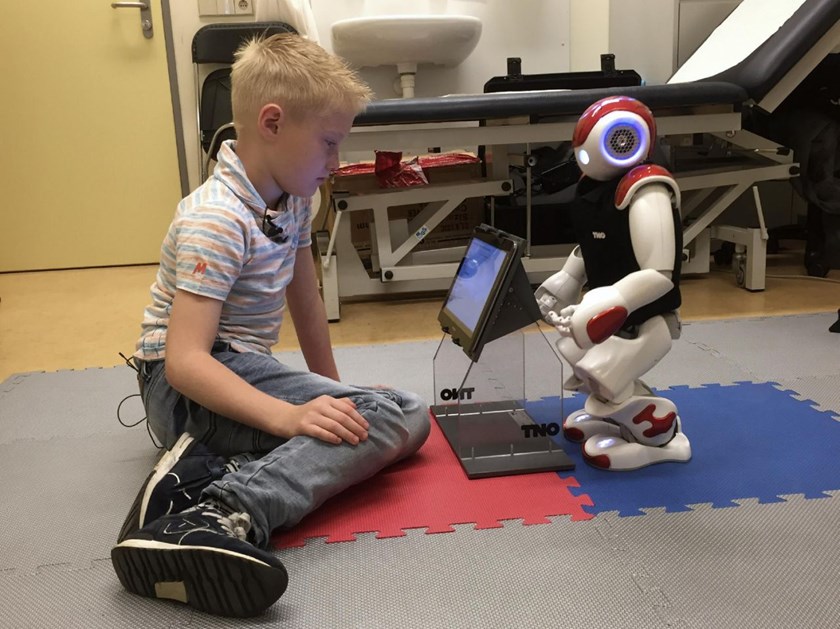
Cheeky Ruben is just seven and learning to read. But thanks to his new knee-high buddy Charlie robot he can expertly measure his blood sugar and count carbohydrates in a glass of milk.
 |
Cheeky Ruben is just seven and learning to read. But thanks to his new knee-high buddy Charlie robot he can expertly measure his blood sugar and count carbohydrates in a glass of milk.
Such skills could be life-savers for the blonde Dutch boy diagnosed with childhood diabetes just over a year ago.
Just like other kids his age, he enjoys birthday parties, riding his bike or playing video games. But these can all play havoc with his blood sugar levels, and unlike his peers, Ruben has to learn how to navigate such potential minefields while managing a disease he will have all his life.
There are roughly some 6,000 children across The Netherlands with Type 1 childhood diabetes. And at least one a year dies from the disease.
Now thanks to a unique collaboration between healthcare professionals, robotics engineers and academics in the Netherlands, Italy, German and Britain, families struggling to learn about the illness and manage it on a daily basis have a new life coach on their side.
He's a friendly red-and-white robot called Charlie, with arms and legs, big round eyes and speakers disguised as ears, who can talk and dance.
Some 40 Dutch children have so far been involved in the testing -- the first phase of a four-year EU-funded project launched in March 2015.
Young patients can chat with Charlie during clinic visits -- currently two hospitals in The Netherlands and one in Italy are participating. And the kids have access to Charlie's avatar twin whenever they want on their tablets and computers at home.
There's a staggering amount to learn.
"A child and a parent with diabetes thinks about diabetes every 10 to 15 minutes a day," said paediatrician Gert Jan van der Burg, medical director at the Gelderse Vallei hospital in the Dutch town of Ede.
Coma risk
In Type 1 diabetes, the pancreas fails to produce the hormone insulin needed to break down sugars in the blood to convert into glucose used for energy. These can then build up to dangerous levels. The only way to control the disease is by regularly taking in insulin either through injections or a pump.
Children and parents must figure out injections, blood sugar levels, carbohydrate intake, knowing how much insulin to take. Too much or too little can cause shock, seizures and even coma.
"It's a huge burden and that's why a lot of children with diabetes also have a lot of social problems," Van der Burg told AFP.
Parties awash with cake, or trips to kid-friendly fast food places, sports days, even an hour on a favourite video game can all send blood sugar levels soaring dangerously too high or too low.
"What must you do if you are feeling hypo?" Charlie asks Ruben in one play session, referring to hypoglycemia when blood sugars are too low.
Charlie can talk -- in Dutch and Italian at the moment -- but the questions are also written out on a tablet in front of the child, with an answer and a line "true or false?"
The mini robot is currently aimed at children between the ages of seven -- as they can read a little -- and 13 to 14.
"We've noticed that he is counting his carbohydrates much more," said Ruben's mum, Caroline van As.
Although it's faster if she intervenes, she knows that "he has to learn, it's his life".
"We try to live as normal a life as possible, even if we know he could suffer for it the next day."
Unlike the more common Type 2 diabetes which develops more often in adults and results from unhealthy lifestyles, the exact cause of Type 1 is unknown. Genetics play a role, but researchers believe there is also an as yet unknown environmental factor, such as possibly a slow acting virus.
The $4.5 million project called Personal Assistant for a Healthy Lifestyle (PAS) is a collaborative effort between the Dutch Organisation for Applied Scientific Research, TNO, and its Italian and German counterparts FCSR and DFKI as well as TU Delft university and Imperial College in London.
Emotional support
It aims to develop "a specific new kind of character that supports the children to cope with the disease, to learn what the disease is, to learn what the effects are of exercising, or food for example," said senior research scientist Mark Neerincx, from TU Delft.
For children acutely aware they are different from others, Charlie also provides "social support, that helps them to express their feelings also when they feel bad... they can tell the robot and share some experiences".
Charlie builds up a profile of each child, so he gets to know them and their likes and dislikes.
"Charlie's nice, he ask questions about me. I like to play with him, he is helping me learning things about diabetes," said 10-year-old Sofiye Boyuksimsek, diagnosed two years ago.
Researchers are now expanding the trials to better assess the needs of children and parents, as well as improving Charlie's voice and making his interactions more conversational.
"It's not only that they want to learn about the diabetes. A little small talk with the robot is already very valuable," added TNO researcher Olivier Blanson Henkemans.
(Source: TNNews)




